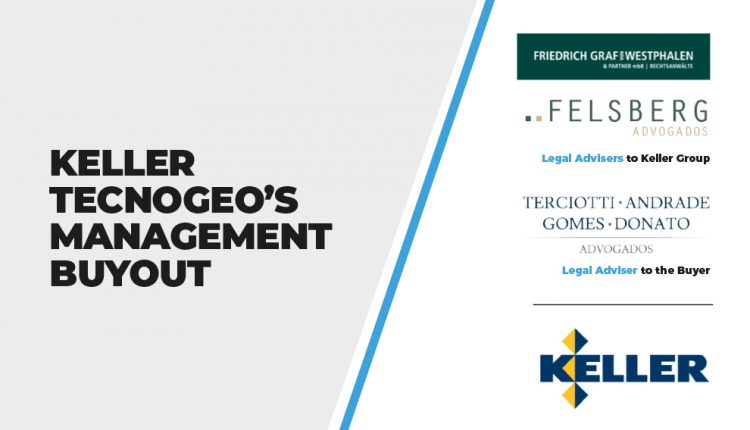Keller Tecnogeo’s Management Buyout
Keller was advised in Brazilian law by Friedrich Graf von Westphalen & Partner (Anneliese Moritz) for corporate/contractual law and Felsberg Advogados (Gabriel Paranaguá) for tax law.
A group of executives and engineers (MBO) acquired Keller Tecnogeo Fundações Ltda. (now Tecnogeo Ground ) in April 2020.
Tecnogeo was the subsidiary in Brazil of Keller Group (Keller), the world’s largest geotechnical specialist contractor.
Tecnogeo´s team will continue to apply its long-term expertise in advanced specialized geotechnical , foundation and ground improvement works to service its clients in Brazil. With around 450 staff and operations across South-America, Tecnogeo generates annual revenue of R$ 120 million.
An interview with Anneliese Moritz at FRIEDRICH GRAF VON WESTPHALEN & PARTNER
Brazil has very peculiar legislation and case-law relating to the liability of shareholders compared to other legal systems.
Please tell me about your involvement in the deal and why it was right for you and your team to work on it.
I acted in the deal as sell-side legal adviser for Keller. I have been advising Keller in Brazilian corporate transactional legal matters since 2012, which means that I know the client and its business well. Knowing the client’s business and culture is essential, as behind the numbers and legal issues, a lawyer deals with people, and in cross-border matters, with people of different cultures. Being able to bridge cultural gaps existing between the parties not only by knowing their languages, but also their law and business mindset, are a plus that makes all the difference.
How is this deal inserted in the current M&A deals trends involving foreign investors in Brazil?
Another issue that often plays a relevant role is intellectual property.
This deal is a management buyout whereby a foreign investor exited Brazil selling the subsidiary to the local management. The country’s current recession and devalued currency certainly create good opportunities for foreigners who intend to strategically enter the Brazilian market by purchasing companies and assets for low prices. It is, therefore, a perfect moment to invest for those who have a greater risk tolerance or intend to become present in Brazil in areas that will inevitably have a return sometime in the future, such as infrastructure. More conservative investors, however, have sought in the past couple of years to exit Brazil by either selling or winding up their local operations. However, many of such withdrawing investors keep an eye on the country and tend to maintain low cost local structures, either of corporate or contractual nature, to be able to quickly react in case opportunities appear.
What are the usual challenges in this kind of deal?
Brazil has very peculiar legislation and case-law relating to the liability of shareholders compared to other legal systems. There are several exceptions to the limitation of shareholder’s liability, which results in indemnification clauses always being in the spotlight during negotiations.
Another issue that often plays a relevant role is intellectual property. In cases where technology and know-how have been transferred to a Brazilian entity, contractually enforceable constructions to protect intellectual property become a key issue, as the autonomy of the parties to agree upon a licence – and not necessarily a transfer – of a technology or a know-how has been, in principle, permitted only since 2017.




